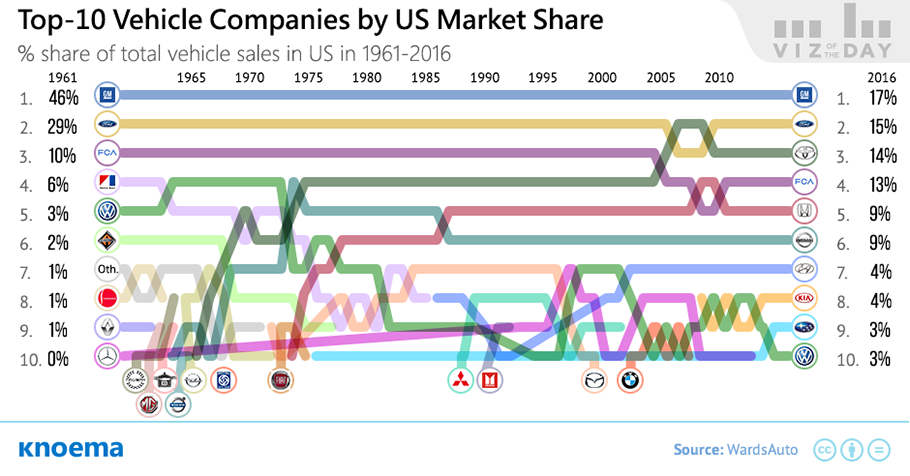Over the last three years, car sales in the US market have set new all-time records and included a collection of manufacturers that extends well beyond the American classics. In 2015, vehicle sales in the US reached nearly 17.5 million units, a growth of 5.7 percent from 2014 and 25,000 more vehicles than the record setting sales in 2005.
- The year 2000 marked a turning point in the US auto industry: it was the last year that General Motors and Ford Motor Company combined made up at least 50 percent of the US market share. GM’s share of the US market has decreased almost 3 times since its peak of 50.7 percent in 1962, falling to 17 percent in 2016. Ford Motor Company’s market share has likewise fallen but relatively less, from a high of 29.3 percent in 1961 to 14.6 percent in 2016.
- Asian auto manufacturing giants Toyota, Honda, and Nissan have been behind most of the market erosion of traditional US manufacturers. Toyota was an early mover, capturing American hearts with Lexus, its luxury business model. In 1980, Toyota’s market share was a mere 6.6 percent; by 2009, it reached 16.7 percent. Then, entered Infiniti Nissan, which nearly tripled its market share from 2.8 in 1978 to 8.8 in 2016, somewhat at the expense of Toyota.
- It is interesting to note the stability of Fiat Chrysler Automobiles (FCA), which unlike the other American classics, has for 55 years maintained a market position in the range of 10.5 to 13.5 percent.
Материалы по теме
The Global Electric Car Market
Electric cars constitute less than 0.1 percent of the vehicle market today, but market and regulatory forces all but ensure electric vehicles will be the future of the auto industry. According to the 2016 Global Electric Vehicle Outlook from the International Energy Agency, the global electric car stock has grown rapidly since 2010, from about 2,000 cars in 2005 to nearly 1.3 million in 2015. The boom in the electric car industry is usually attributed to three factors:The increasing recovery cost globally for fossil fuels used in conventional vehicles;The environmentally-friendly potential of electric vehicles, which produce fewer CO2...
Vehicle Days to Turn (DTT) by Manufacturer and Segment
Days to Turn is the average number of days vehicles were in dealer inventory before being sold during the months indicated. Source: www.edmunds.com
Consumer vehicle purchase intent by manufacturer and segment
Edmunds.com's "Consumer Vehicle Purchase Intent by Manufacturer" for a specified period is the percentage of visitors to www.edmunds.com who perform activities on that website that are highly correlated with a purchase of that model within the following three months (as determined by Edmunds' statistical analysis of visitor activities), as a share of visitors who perform similar activities for all models that are in the same manufacturer segment. Edmunds.com believes that "purchase intent" is a metric for measuring a model's share of consumer demand. While actual model sales are affected by several factors other than consumer demand...
